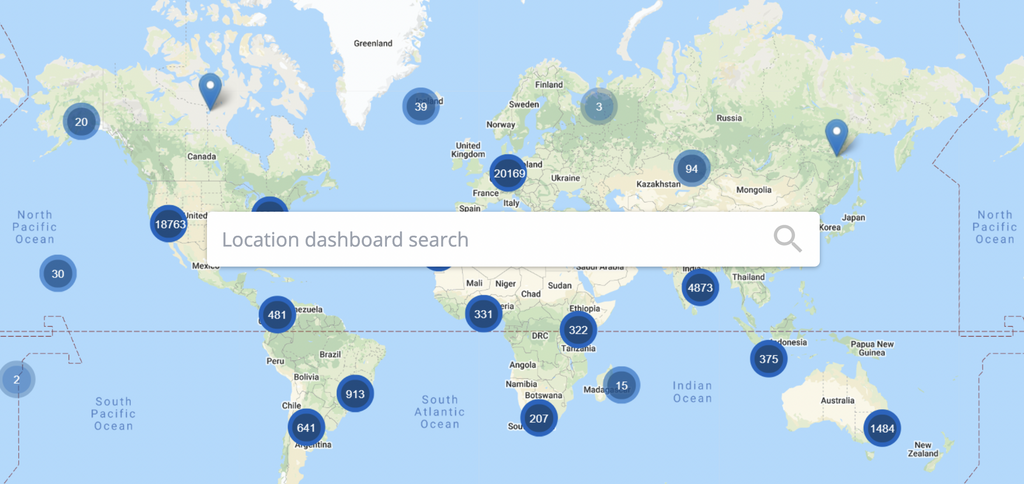One of the main services offered by StartupBlink is Startup Ecosystem Development for the public sector and government agencies around the world. We are helping dozens of governments around the world to accelerate their startup ecosystems with our different ecosystem development modules.
This article serves as a comprehensive guide on startup ecosystem development, exploring the core features and components that enable startup ecosystem developers and governments to create their own startup ecosystems, provide support, and facilitate growth.
Before we can delve into the dynamics of startup ecosystem development, it is crucial to have clear definitions of the terms discussed.
What is a Startup?

According to Investopedia, a startup is a “a company in the first stages of operations. Startups are founded by one or more entrepreneurs who want to develop a product or service for which they believe there is demand. These companies generally start with high costs and limited revenue, which is why they look for capital from a variety of sources such as venture capitalists.”.
So far, the definition can be confused with a somewhat traditional business model where a business is created to supply the market with a product. However, startups differ in some key areas, namely but not limited to, the use of non-traditional financial scales or self-funding, the disproportionately high risk of failure, focus on adaptation, innovation, and positive impact, technological advancement, and teams made of passionate and self-driven individuals.
Here in StartupBlink, we have analyzed thousands of startups across hundreds of cities across the world to compile our latest Global Startup Ecosystem Index Report.
Our definition of a startup reflects our process and methodology of selecting and evaluating startups around the world.
“A startup is any business that applies an innovative technology-enabled solution that has the potential to achieve scalability.”
And according to some entrepreneurs, like CEO of Homejoy Adora Cheung, a startup is really more of a “state of mind”.
What isn’t a Startup?
Knowing what isn’t a startup is just as important as defining it.
No definition is entirely objective and over the years, many have tried to set hard and fast numbers that can narrow down the definition of “what makes a startup a startup”.
For some, this includes numerical criteria on numbers of employees, revenue or profit.
For our rankings, we do not regard the following as startups:
- Service providers and local directors (such as real estate listings)
- Unicorns or public traded company (valued at over $1B)
What is a Startup Ecosystem?
A Startup Ecosystem is the result of the environment within which startups and other supporting players operate in.
There are multiple factors that we can look at when defining startup ecosystems, and in our reports, you will first find a definition of the hub or particular place, that narrows down the physical location of startup ecosystems, to be able to rank their growth and innovation.
To provide accurate rankings, we offer two sets of rankings that each focuses on the interactions of the key players within the ecosystems:
- Countries
- Cities
Because determining the origin of a startup can be complicated in today’s global economy, when ascertaining the strength of a startup ecosystem, we put less focus on where a startup is currently headquartered and more on where it was birthed.
While the presence of startups within an ecosystem is the first and most vital piece, they must be complemented by investors, service providers, incubators, coworking spaces, startup organizations, universities, investor networks, and many other players, for them to become successful and thriving startup ecosystem hubs.
It is this combination of multiple internal and external factors that fuses to create a vibrant startup ecosystem. The “soft” and “hard” infrastructure components of startup ecosystems will be explored below in more detail.
The Components of Startup Ecosystem Development
In this section, we will briefly explore the components that make and maintain the vitality and vibrancy of startup ecosystems. As previously mentioned, ecosystems are primarily focused on startups. However, they require a network of support in order to stay alive.
These can be broadly broken down into hard and soft infrastructure systems that follow the same premise as industrial categorizations of hard and soft infrastructure.
In addition to startups themselves, there are half a dozen key components that every startup ecosystem needs to include in order to thrive.
Hard vs Soft Startup Support Systems
You can also look at the components of startup ecosystems as “hard” versus “soft”.
Hard infrastructure development includes the physical spaces such as coworking spaces, incubators, accelerators and universities while the soft infrastructure is the mentoring groups, startup networks, and community support that is present in an ecosystem.
Universities, Colleges and Education Providers

The idea here is that education providers create sought-after talent and for this reason, they have often been called the “original incubators”. Additionally, even when universities are not able to keep up with the demands of the market, they can develop the culture of entrepreneurship, through programs, training days, courses, and bootcamps, where students can be equipped with in-demand skills. When these are combined with hiring or mentor programs hosted by startups, this creates an opportunity for future employment opportunities.
Funding Organizations

Self-funding is the most popular path for most new entrepreneurs. However, the presence of funding providers like angel investors, venture capital firms, and government loans is vital for the future success of the ecosystem.
Support Providers

Coworking spaces, incubators, and accelerator programs all need to exist within a healthy ecosystem in order to push it forward and create the necessary opportunities. They offer an opportunity for young entrepreneurs to pitch their ideas, secure funding and have a place to call “office” at affordable prices before their business can take to the skies. In addition, the creative and collaborative culture within coworking spaces means that fellow freelancers and entrepreneurs are nearby, whether you need a new manager or someone to run an idea by.
Lack of Trust
One of the biggest problems we have identified in underperforming ecosystems is a lack of trust in the network. The mentality where people are not trusting others and are secretive and less open with their ideas creates a situation where key factors like finding a cofounder becomes impossible. If you don’t share your ideas, and remain in “stealth mode” you will not also not be getting any feedback or discussions on your product or services. These are all things that are not happening in healthy ecosystems. .
Lack of capital
A very practical aspect of startup ecosystem development that can hamper growth is of course the lack of capital. As previously discussed, investors are attracted to popular and buzzing innovation and growth hubs, because they have already proved themselves and have an established network that can contribute to future startups. Since investors are primarily concerned with ensuring their ROI, they might be harder to convince to invest in locations or startup ecosystems that are less developed.
Another side of this discussion, and often one of the most important ones, is the lack of self-funding options. According to Entrepreneur, less than 1% of startups secure angel investor funding, while a minuscule 0.05% are funded by venture capitalists. Most startups are funded by personal funds, loans, or friends and family support.
Why do strong Startup Ecosystem developments matter for entrepreneurs?
Now that we have covered how startups and startup ecosystems are developed, we can explore why they are important for entrepreneurs and business people.
Startup ecosystems are the nurturing home within which your ideas and dreams can be supported and take shape.
Where are the unicorns?

From our research and data, we know that unicorn startups, those magical entrepreneurial startups valued at over US$ 1B, have by and large formed through startup hubs. Specifically, over 90% of unicorns are born within the global top 15 or so startup hubs. This signifies the importance of networking and access to resources that can push the startups forward.
It is also important to note that unicorns create a domino effect in the ecosystem, as their success brings more attention and investment to the ecosystem, increasing the potential of producing more unicorns.
A positive spin on the FOMO mindset
A relatively new term used originally to describe social media anxiety, FOMO or Fear of Missing Out, has become a well-studied psychological phenomenon that applies itself to the psychology of entrepreneurship and offers insights into the importance of strong ecosystem development.
FOMO is often a negative and unwanted side effect of increased social media usage in millennials and young adults, and lowers self-satisfaction, however, in the world of entrepreneurship, where a success or failure mindset is prevalent, and missed opportunities, inside information and timing is everything, it becomes a driving force.
The top-performing and rising startup ecosystems attract more investors and other dynamic and significant players that want to be a part of the dynamic force within a certain booming hub.
Support Network
Startups are nothing without the right individuals. If you are a hopeful entrepreneur looking to launch your next big idea, your ecosystem is what will enable you to collaborate and grow, test your approach, secure investments, access resources and ultimately launch. A key component of startup ecosystems is the idea of knowledge sharing and networking, and that is the culture that will support your entrepreneurial journey.
Why Startup Ecosystems matter for the economy?
Startup Ecosystems are hubs of innovation that create opportunities not just for entrepreneurs and their region but also for the global market and economy.
Some of the most significant ways in which startup ecosystems can benefit the economy are:
High quality jobs

The DynEmp project with data collected by the OECD, Organisation for Economic Co-operation and Development, presents an important overall picture of how startups support job creation in their areas through innovation. The research, which focuses on the quality and inclusiveness of jobs created by startups, can inform better policies and has been influential in policy debates.
The Cross-country evidence on start-up dynamics report of 2015, investigated job creation based on a set of criteria that included, the startup rate, size of firm, survival entry and growth rate, and found a disproportionately large contribution of job creation, from a 4% of small but successful startups that accounted for 21% to 51% of jobs created.
While startups are at higher risk due to policies, and volatility of the market, and need to be protected through better policies, they evidently contribute massively to job creation.
It is also worth noting the importance of tax revenue due to high-quality job creation and exit taxation of corporations that generate a good deal of money.
Prevent brain drain
Brain drain is defined as the mass exodus of a highly skilled and influential workforce of professionals and entrepreneurs that seek employment opportunities outside of their region. While brain drain can occur simply due to professionals seeking new and higher-paid opportunities elsewhere, mass migration is often due to a financial crisis and a lack of support or resources.

In recent years, countries like Greece, which were hit particularly hard by the economic crisis of 2020, suffered losses of 350,000 to 400,000 professionals that moved abroad for hopes of a better job. The government’s scheme, aptly titled Rebrain Greece, is a good example of an initiative that recognizes the importance of reclaiming your best minds, to support the economic development of a country and subsequently of its startup ecosystem.
Improve Country Image
Lastly, a strong startup ecosystem can improve a country’s image and its strategic and geopolitical situation as well as contribute positively to future investment opportunities.
One case in point here, is the city of Sofia in Bulgaria, which is currently sitting in the Top 200 cities for economic development and tech innovation while not so long ago it was regarded as an outsourcing destination. Now, Bulgaria is a leading global solutions networking hub, and boasts the creation of more than 400 startups, bringing with it lots of foreign investments. For more insights, you can access the Global Startup Ecosystem Index. Additionally, StartupBlink Pro is the ultimate tool to access massive startup ecosystem research in 1,000 cities and 100 countries.
Common Problems in Underperforming Ecosystems
StartupBlink has a global network of partners and ecosystem developers that has allowed us to ascertain common areas between most underperforming ecosystems. These are the factors that repeat themselves across borders and cultures and will need to be looked at in more detail if you fear your startup ecosystem is languishing.
Cultural Mindset
There is a range of phenomena that go under the cultural mindset umbrella. The first centers around the idea of risk aversion and how much traditional employment in 9 to 5 jobs is valued over entrepreneurial endeavors. This does not mean that entrepreneurs and startup ecosystem developers are not risk-averse, but quite the opposite.

Business-oriented people know how to calculate and lessen risks, have realistic options carved out for funding and sound revenue models. While estimating risk preferences is in general, a complicated and multifaceted approach, the general consensus is that countries and individuals within countries with a positive correlation between risk tolerance and personal income.
Similar to the point above, the image and mindset of entrepreneurship in some areas or countries can still carry extremely negative connotations and such not be regarded as a good path. Specifically, people in post-communist countries like Bulgaria, Georgia, Lithuania and Kyrgyzstan, have ambiguous views towards entrepreneurs and business owners, with 50% of people in Georgia agreeing with the statement: “Entrepreneurs get rich by exploiting other people’s work.”
This creates a cultural mindset where successful entrepreneurs are not viewed as heroes but as manipulators of the system to gain an advantage.
Lack of Trust
One of the biggest problems we have identified in underperforming ecosystems is a lack of trust in the network. The mentality where people are not trusting others and are secretive and less open with their ideas creates a situation where key factors like finding a cofounder becomes impossible. If you don’t share your ideas, and remain in “stealth mode” you will not also not be getting any feedback or discussions on your product or services. These are all things that are not happening in healthy ecosystems. .
Lack of capital
A very practical aspect of startup ecosystem development that can hamper growth is of course the lack of capital. As previously discussed, investors are attracted to popular and buzzing innovation and growth hubs, because they have already proved themselves and have an established network that can contribute to future startups. Since investors are primarily concerned with ensuring their ROI, they might be harder to convince to invest in locations or startup ecosystems that are less developed.
Another side of this discussion, and often one of the most important ones, is the lack of self-funding options. According to Entrepreneur, less than 1% of startups secure angel investor funding, while a minuscule 0.05% are funded by venture capitalists. Most startups are funded by personal funds, loans, or friends and family support.
Should private sectors promote their ecosystem?

Private sector organizations and entrepreneurs are not responsible for promoting their startup ecosystem, however, it is something they should do under certain circumstances and it can potentially be a beneficial approach.
To start with, becoming an ecosystem connector increases your network leverage for your personal project and increases your visibility. The key here is to focus on genuinely supporting and giving back to your ecosystem first, before looking at a way to leverage it for your own gain. The latter is the desired outcome that will happen organically but not if you are seen as trying to promote your project too aggressively.
How can governments support startup ecosystem development?

Government support and regulations can to some degree break or make good ecosystems. Most governments should have a vested interest in supporting and promoting the creation of their ecosystems and there are many ways that this can be achieved. In times of crisis, like the recent COVID-19 pandemic, government and public sectors should be even more present, and they are expected to interfere and provide solutions to the specific needs of their ecosystem.
For a more in-depth discussion on how governments can support their startup ecosystems in times of crisis, you can read more about it here.
Public sector policies are critical for ecosystem success
If government policies are creating uncertainty, fear and confusion with founders, this creates a toxic and detrimental environment that most ecosystems will not be able to survive.
Similarly, bureaucracy can make the entrepreneurial journey and hurdles of getting started even more pronounced and dissuade startup ecosystem developers from staying within that ecosystem or from starting in the first place.
In addition, the geopolitical situation of a country and rising tensions play a big role in the development of ecosystems due to the logistics of travel limitations and open borders. We have seen some countries, like Israel, Rwanda and Colombia mitigate some of those limitations in order to support its ecosystem, however, it is not something that is easy to survive.
For more suggestions on how the public sector can build and maintain a successful ecosystem, you can look here.
What startup ecosystem should I join?

For anyone looking to join a startup ecosystem over corporate culture, or for those that are already in the startup sphere and seek to evaluate its effectiveness for your project’s sustainable growth, we have a few words of advice that can be relevant.
You don’t have to move to San Francisco
Not everyone needs to be in the Top 5, Top 10 or even Top 100 of startup ecosystems globally. It is actually more important for your choice to align with your goals and values and focus on vibrancy and movement within the ecosystem. Is there momentum in the startup ecosystem at the moment? Do you have access to mentors, angel investors and a supportive community? These are features that you can find in a lot of different locations.
Location dependency
In an ideal world, you would be free to join a startup ecosystem in the country or region of your choosing. However, this might not always be the case and that is okay. You can still pick the best of the options available that will fit with your goals. The Top 100 cities ranked in our Global Startup Ecosystem Index are incredibly diverse and you are guaranteed to find one near you that will fit your criteria.
Focus on the verticals and industries
The idea of verticals or industries might be the most important criterion when you are picking your new startup ecosystem to call home and develop within. In the same way as business verticals, startup industries have a specific niche that they revolve around and focus on.
As an example, if you are operating in the hardware industry, Shenzhen might be the best location for you. However, if you are gearing towards fintech, then Singapore has one of the best startup ecosystems that you should strongly consider.
StartupBlink can build customized startup ecosystem portals for the industry of your choice, that can become a leading database on your organization.
Conclusion
A startup ecosystem is a diverse, complex and changing entity that can grow and flourish when given the appropriate support but just as easily crumble if all the moving pieces are not aligned. There are soft and hard components that very broadly make up a startup ecosystem, and both need to be present to operate successfully. Individuals that are worried about what startup ecosystem they should join, should focus less on the top ranking hubs and more on their values and industry-specific verticals.









